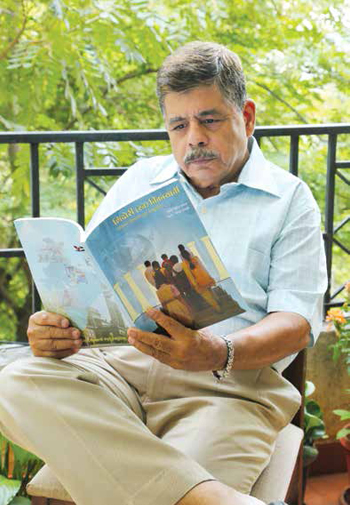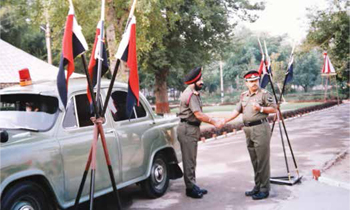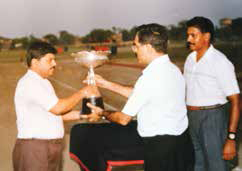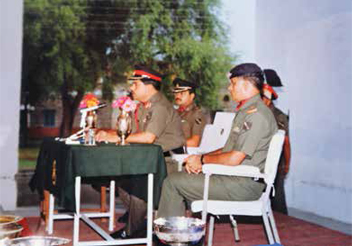
War veteran and retired artillery officer Col Sudhir Naphad is a firm believer in the power of the mind in overcoming difficulties. "When you harness the potential of your thoughts and emotions there is little that you can't overcome," he says.
A simple belief that led to his founding Paramheet, a voluntary organisation dedicated to counselling, psychotherapy and mental health, post-retirement in 2005.
Even as his career got off to a challenging start as a second lieutenant in the 1971 war, to subsequently going on to command two regiments, including the 164 Field Regiment and the Military Police (Southern Command), Col Naphad has witnessed firsthand, that both an individual and the organisation are a direct thought product of their attitudes, thoughts and approach—all of which come under the gamut of mental health—which he lucidly points out, is much more than the absence of mental disease. "The manner in which we respond to the challenges of day-to-day life, the positivity and sensitivity we show towards those around us, all of this is mental health," he points out.
Having traversed diverse territory—both in his personal and professional life—he would know. The loss of a beloved spouse to lung fibrosis, dealing with the issues of his men and motivating them, "to possibly make the greatest sacrifice of all," Colonel Naphad brings both, his life experiences and illustrious military training to the table when it comes to giving back to society through Paramheet.
Equipped with an MS in counselling and psychotherapy which he pursued post-retirement and backed by a dedicated team of volunteers from different walks of life, including some of his colleagues in uniform—all of who have done a basic course in counselling, he believes there's a lot of ground to be covered as far as spreading awareness on mental health in a society as layered and complex as India, is concerned.
To that end, the Paramheet portfolio is at once diverse and united: spreading awareness on the importance of good mental health through awareness programmes in schools, colleges and assorted social forums; parental guidance programmes; workshops on stress-management for both students and professionals, including police officials and PMPL staff; organising discussions or seminars on relevant topics through various experts; training and research in psychotherapy; as well as encouraging educated people to learn the skills of counselling, and further spread the good word. So far, the trust has reached out to more than 10,000 students and about 2500 parents and teachers across 150 schools all over Maharashtra, apart from bringing out eight to ten books on topics pertaining to emotional balance, parenting, soft skills and overall well-being.
This is his mission, post-retirement and this is how he tells it
Indian society, on the whole, is rather ignorant about mental health. It is not the absence of mental and psychological disorders alone that establishes us mentally sound people, but also the ability to deal with life’s issues positively and rationally, and the sensitivity and grace with which we interact with people
I have always been interested in mental health, and observing how human beings respond to situations. In the army, one is exposed to a potpourri of people from different backgrounds and yet, all of them march together as one. The reason for this tremendous motivation is a deep sense of belonging to one's regiment, as well as an abiding commitment towards one another.
If the '71 war with Pakistan taught me one thing as a young officer, it is that the human body is capable of withstanding tremendous emotional and physical stress provided one's mind is focused on a cause that goes beyond one's self. When you are in active combat, honestly, you are more worried about the well-being of your men, than yourself. You feel responsible for others and that is a valuable quality the army inculcates in each of its men.
Years later when I took command, I got to observe at close quarters the several issues that my men dealt with simultaneously: from family pressures to performing on the job. I'd do these informal counselling sessions with them and I realised that when people share what's on their mind with others, it is both therapeutic and healing. It also revved up their professional output.
In my personal life, the manner in which my late wife Rekha dealt with her lung fibrosis taught me a lot, even as I tried to ensure her end came about peacefully. I had two young daughters in college to bring up—so those days were a valuable time spent in developing coping mechanisms. Grief comes to everyone. It is the manner we deal with it that can make or break us for grief also teaches you lessons not found in any textbook.
Around that time, I took an early retirement from the services and started working in an Indo-Swiss vocational training trust, which was focused on recruiting and empowering industrial employees through intervention programmes. I couldn't help but notice the vast difference in training methodology between the army and the civilian world. So, I thought: why not bridge the gap? To that extent, I pursued an MS in counselling and psychotherapy from IBMS, a duration that got me in touch with a most interesting set of batch mates. So I pondered over the possibility of starting an institute that would combine the assorted talents of its various trainers (who have retired from different professions) to contribute to the cause of mental health in society.
Thus, Paramheet was founded in 2005.

After graduating from National Defence Academy Khadakwasla and Indian Military Academy Dehradun, Sudhir Naphad got commissioned in the Regiment of Artillery in Indian Army.
Within a year he got the opportunity to participate in 1971 Indo-Pak war in the Western Sector. For the valour shown in this war his regiment was awarded battle honour title "Parbat Ali".
During his service of 31 years in the army he served on many important appointments in brigade, division, Corp and command headquarters.
He commanded an artillery regiment in Punjab during anti-terrorist operations. He also had a couple of successful tenures as an instructor in School of Artillery, Deolali, Nashik. He retired after serving as a commanding officer of a Military Police Unit in Pune.
I would say that Indian society, on the whole, is rather ignorant about mental health. I repeat: it is not the absence of mental and psychological disorders alone that establishes us mentally sound people, but also the ability to deal with life's issues positively and rationally, and the sensitivity and grace with which we interact with people.
There is stigma attached to counselling—I wonder why that is so. When you get hurt, do you wait for a scratch to become septic before you seek help and intervention? Then why don't we deal with mental issues and stress before they acquire massive proportions?
Paramheet is a Sanskrit term that means "the highest joy of life." And what higher joy can there be than peace of mind? While our philosophy and mission clearly states that we strive to create a society in which there is harmony between individuals, thereby setting each of us free to fulfil our own aspirations, we decided initially to focus on youngsters between 13 to 19 years as this is the most impressionable age group of all.
To that extent, we approached schools to conduct our 'Ten Point Programme' for class X and XII students that shows the children how they ought to cope with stress, control their emotions and at the same time, utilize their time to study to the optimum. The programme was a success and the rest as they say is history. Till date we have covered over 150 schools across Maharashtra and counting.
Yes, and absurdly so. The reasons for this are twofold: firstly, we attach unfounded prestige to the outcome of examinations, firmly believing that a 'good family' is one in which the kids score high on their academics; and secondly, the lack of information regarding the vastness of the opportunities outside the gates of school and college. To that extent, career counselling becomes important, and that was our next logical step.
To this end, we tie up with schools and social institutes like Rotary's and Lion's Club. We also offer career counselling to students who need it. This includes putting them through standard psychometric tests on IQ, aptitude, personality etc, apart from taking inputs from parents and teachers on that individual's assorted interests, family circumstances and so on.
That said, it is soon going to be that time of the year when news channels and other mass media will go to town about “The War of the Xth boards” or the “Gladiatorial Arena of Std XII”. What ridiculous terminology and how very misleading! No wonder the children are so stressed—it is us adults who are responsible for promoting their performance as a 'do or die' situation, comparing it to war, no less!
How much more prudent it would be if we focused on the joys of learning, instead of the outcome. Call it a game if you please, but not war. In our ten point programme, we ask children to approach their board exams like a game, and accept the outcome sportingly. Young lives are precious; they need to be told repeatedly that there is nothing that is the end of the world.
Some months back, I had been invited to do a workshop with the senior students of a school in a village near Gadchiroli. This was followed by a session on career counselling. As I finished for the day, and the students left, a young girl came up to me, and with tears in her eyes thanked me for "saving her life" because she had been all set to take her life that very morning, but something made her attend my workshop. After listening to me, she said, she realized that life was about overcoming obstacles and being strong and patient. Such moments are the most rewarding of all.
In our Ten Point Programme we ask children to approach their board exams like a game, and accept the outcome sportingly. Young lives are precious; they need to be told repeatedly that there is nothing that is the end of the world

We are living in a transitional society, where the tried and tested is increasingly giving way to the untried and untested. This is both good and bad, but parenting against such a canvas becomes even more complex. The joint family system, by and large, does not exist anymore; more often than not, the nuclear family is the core unit and the burden of parenting is entirely on the couple, without the guidance of the family elders. The avalanche of social media, and an increasingly consumerist economy makes it hard to bring up children with the right values.
Despite their best intentions, parents end up making mistakes that can be avoided. To that extent, Paramheet volunteers try to put things into proper perspective. As a society, we are so focused on making doctors, engineers and lawyers out of our children that we tend to forget that we are simultaneously bringing up citizens as well, and that their soft skills are as important as their professional degrees. Parents need to strike that balance in their upbringing. At the same time, they need to know when to back off. I know a student who is clearly not cut out for engineering, but is nevertheless reluctant to cut short his losses, and pursue a regular bachelor's degree, simply because his parents donated a massive sum of money to the college. It's a task to convince the parents that better one year lost, instead of a lifetime of frustration! But this is an important and regular challenge in our world.
I also have an example of a handicapped student due to polio, who had developed inferiority complex and was not able to pursue his studies successfully. On top of it the constant bickering of his parents and comparison with his younger sister had left him frustrated. About 20 counselling sessions over a period of three months did wonders. Not only did he clear a few papers of his second year B Com degree, but also cleared all the subjects of his final year in one go. There was only a need to make him realize his own mental power and utilize them successfully.
Similarly, we felt the importance of teacher's training in helping scale up both the quality of the teaching as well as the motivation levels of the teacher. Recently we tried out a new technique called SQ3R, which means "Survey, Question, Read, Register and Recall" for the teachers of a school. One of them got back saying that this method of organising her day's lesson plan had upped her productivity by as much as 40 per cent.
One of our most interesting modules is the combined "Parents-Teacher" workshop, wherein we use different methodology to help them understand each other's positions. We give them various topics on which they come up with plays, in which parents play the role of teachers, and teachers play parents. Not only is this creative and fun, it helps them develop empathy for each other, which to my mind is critical in building camaraderie between these two important pillars of a child's life.

Several members of our organisation are alumni of the National Defence Academy, Khadakwasla. It is one of the premier world-class institutes that trains officers for all three services of the Armed Forces, and it makes sense for us to include it as part of a motivational exercise for youngsters. The NDA authorities, very graciously allow us to take groups of 40-120 school and college students between classes IX and XII to their premises. Apart from a conducted tour of the NDA, the students are acquainted with its august history and all that it stands for.
Oh yes. Our work regularly takes us to people from different walks of life, and it is a revelation how similar human aspirations are, despite the seeming differences. Everyone wants respect, compassion and understanding. I recently did a workshop with police personnel from the Police Training Academy at Nashik on stress management. They enjoyed it all, the relaxation techniques as well a chance to share all that they go through. Then there was another workshop on stress handling techniques for employees of PMPL—few people realize how hard it is to driving around Pune all day long and rarely appreciate the staff for all that they do. That's sad.
A mere act of going to them and telling them how we appreciate their hard work and would like to help them to manage their stress is so motivating for them. I sincerely wish the superior officers in their respective organisations make some efforts to cheer them up occasionally and raise their spirits.

As part of our objective to promote awareness and understanding, offering a basic certificate course in psychological counselling becomes imperative. The eligibility criteria for admission is Std XII and above 18 years.
The course covers vast ground ranging from the developmental aspects of the human being, right from conception to old age. However, these stages are not clear-cut, water tight compartments but overlap each other. The person undergoes certain physical, physiological, emotional and intellectual development in each of these stages and attains a certain amount of maturity. The ability of a person to handle various challenges and make adjustments determines his/her personality. A psychologist must have sound knowledge of this vital aspect of human life. Apart from this, the course covers the psychology of adjustment, crisis management and decision making. To that extent, we take them through the methods and techniques of counselling. The course is modular in nature, and each of the three modules is of two months duration, followed by an assignment. The participant needs to score an average of 45 per cent before being awarded the certificate.

Paramheet is a social public trust registered under Bombay Public Trust Act 1950, active in the arena of promoting mental health across various strata of society through workshops, interactions, counselling and assorted techniques of psychology, including role play, visualization etc since 2005.
Its target groups are largely divided into: students, parents and teachers and teacher training workshops, apart from which its volunteers do stress management workshops for assorted groups. The workshops are conducted in lecture cum interactive discussion mode; the participants would be expected to make individual and group study case presentations.
They also carry out career counselling using standard psychometric tests, which help students understand their own potential. The child is then encouraged to collect maximum information on his/her own chosen field. Paramheet also offers a basic certificate and a diploma course in psychological counselling. Paramheet can be contacted at: Flat no. 403, Rambag Society, Kothrud, Pune-38. For guidance and counselling they can be reached at paramheet@gmail.com For more information visit their website www. paramheet. org.
We also offer a diploma course for graduate students. The course covers more practical aspects of counselling, including a project work involving some field work.
We are living in a transitional society, where the tried and tested is increasingly giving way to the untried and untested. This is both good and bad, but parenting against such a canvas becomes even more complex
Apart from this, we offer a modular programme for young adults between 21 years to 40 years, called SEQL, which is short for Self Empowerment for Quality Life. Young adulthood is the most challenging period of our life; various challenges of completion of our education, seeking good career, choosing life partners, developing new family relationships, challenges of young new parenthood etc create tremendous stress. We forget our own self-development. The programme focuses on realisation of self and its development to cope up with these challenges and make our life more meaningful. In fact, this period helps us to build a good foundation for a meaningful and satisfactory post-retirement life.
by Kalyani Sardesai